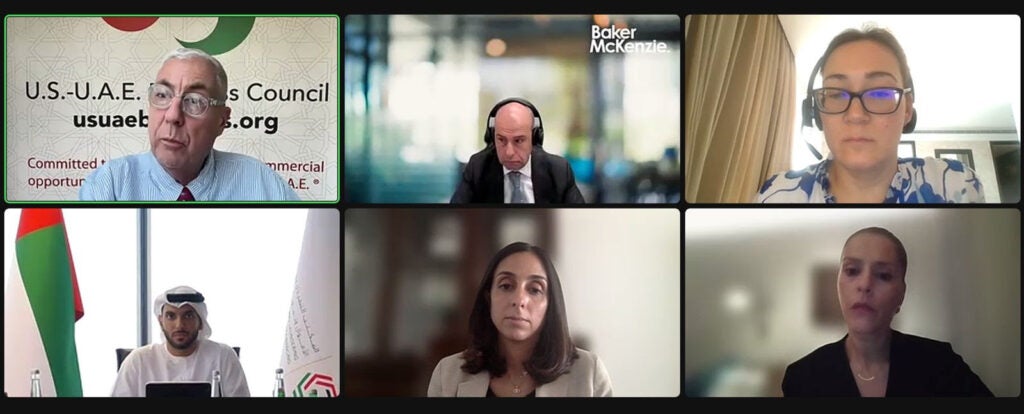
On Wednesday, 18 September 2024, the U.S.-U.A.E. Business Council hosted a webinar detailing the ways in which the U.A.E. has bolstered its anti-money laundering and counter-terrorist financing (AML/CFT) measures contributing to its removal from the Financial Action Task Force (FATF) grey list in February 2024.
Mr. Mohamed Alkatheeri, Director of the Department for National Coordination and Follow-up at the U.A.E.’s Executive Office of Anti-Money Laundering and Counter-Terrorism Financing, noted that the removal of the U.A.E. from the FATF grey list was a significant achievement that reflected the hard work of U.A.E. institutions. He reviewed the U.A.E.’s newly announced National Strategy for Anti-Money Laundering and Countering the Financing of Terrorism and Proliferation Financing for 2024 -27. Mr. Alkatheeri characterized the strategy as building on the successes of previous efforts and centered on 11 key strategic goals such as enhancing international cooperation and ensuring the effective prosecution of financial crime. The strategy also addresses emerging flashpoints such as virtual assets, cyber crime, and the financing of terrorism and weapons proliferation.
Mr. Alkatheeri framed the strategy as risk-based, allowing the U.A.E. to focus its efforts on the most pressing threats. Mr. Alkatheeri underscored that the U.A.E.’s AML/CFT strategy includes private sector engagement and a public-private partnership committee. The public-private partnership committee’s mandate includes consultation on both strategic and operational matters and includes working groups that publish policy papers, guidance documents, and regulations. He explained that the public-private partnership committee provided feedback on the newly-released U.A.E. AML/CFT National Strategy. Mr. Alkatheeri remarked that the ultimate goal is to position the U.A.E. as a global leader against financial crime. He also discussed the government’s focus on the trade of gold and diamonds as a sector vulnerable to money-laundering, and cited the recent suspension of 32 gold refineries in the Northern Emirates as a result of this specialized focus.
Ms. Laura Shingler, Legal Director at DLA Piper, praised the U.A.E.’s actions on AML/CFT that warranted its removal from the FATF grey list. She mentioned increased transparency and enhanced prosecutions for money laundering offenses as two significant improvements. She also cited increased international cooperation and the sharing of financial intelligence with international law enforcement entities as additional positive developments. Ms. Lara Murad, U.S. Financial Attaché to the U.A.E. and Oman, added that she has worked on the AML/CFT issue with the relevant U.A.E. authorities since 2021. She praised the U.A.E. for involving the highest level of government on the AML/CFT issue.
Ms. Murad noted that U.S.-U.A.E. bilateral cooperation has progressed through information-sharing and the formation of a U.S.-U.A.E. AML/CFT Working Group as part of the Economic Policy Dialogue (EPD). This working group covers key areas of focus such as virtual assets, beneficial ownership, and proliferation financing issues. Ms. Murad added that one challenge for the U.A.E. is adopting an effective AML/CFT regime across the seven emirates, but strong involvement from key stakeholders such as financial institutions and the U.A.E. Ministry of Economy has led to successful outcomes. Ms. Murad added that the U.S.-U.A.E. collaboration has led to the development of new AML/CFT best practice.
Mr. Mazen Boustany, Partner at Baker McKenzie, commented on the two new AML/CFT bodies that were established in August 2024 and the ways businesses can comply with AML/CFT amendments. The National Committee for Anti-Money Laundering and Combating the Financing of Terrorism and Illegal Organisations, and the Supreme Committee for the Oversight of the National Strategy for Anti-Money Laundering and Counter-Terrorism Financing demonstrate that the U.A.E. is instituting strategic initiatives to ensure AML/CFT compliance. Mr. Boustany advised that all commercial enterprises in the U.A.E. monitor sanctions lists to ensure that they are not dealing with any counterparty that is on a U.A.E. or U.N. sanction list. Businesses should establish compliance policies and engage money laundering officers in order to avoid sanctions and reputational risks.
Ms. Ibtissem Lassoued, Partner at Al Tamimi, remarked that the U.A.E.’s actions have addressed the historic bridge between the public and private sector on AML/CFT issues. She noted that there are trainings and outreach sessions due to the U.A.E.’s extensive and evolving AML/CFT regulations. She recommended that law firms and financial institutions well-versed in these matters offer training and outreach sessions to ensure that private industry better understands these regulations and how to be complaint with the requirements.
The assembled legal experts outlined best practices that businesses can adopt to develop effective compliance regimes and avoid common mistakes companies make in the process. Ms. Shingler advised that businesses maximize engagement with the public-private partnership committee. She also underscored that businesses must monitor the effectiveness of their compliance programs and take into account their risk assessments, the U.A.E.’s national risk assessment, and the U.A.E.’s updated laws. Ms. Lassoued encouraged companies to adopt a strong compliance culture and align different divisions across a firm, such as sales units, on the AML/CFT issues. She added that new entrants to the U.A.E. market must understand and appreciate local requirements and regulations.
Ms. Murad outlined available resources from the U.S. and the U.A.E. government to assist businesses with their risk assessments and compliance regime. She highlighted that the key U.A.E. government agencies, including the U.A.E. Ministry of Economy and U.A.E. Financial Intelligence Unit, publish guidance documents. She encouraged companies to research the methodologies, typologies, and case studies in these reports. She noted that the U.S. Treasury Department also publishes guidance in line with FATF recommendations.
For more information about this event, please contact Matthew Gardell at mgardell@usuaebusiness.org.
For the contact information of the legal panelists, please see below:
Mazen Boustany
Partner, Baker McKenzie
mazen.boustany@bakermckenzie.com